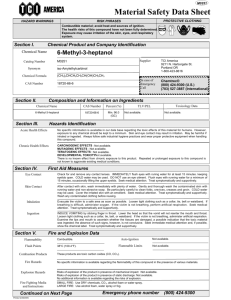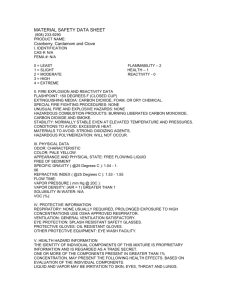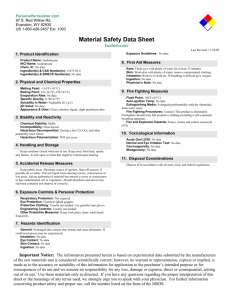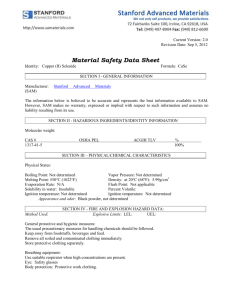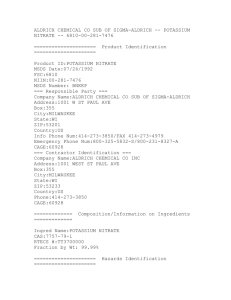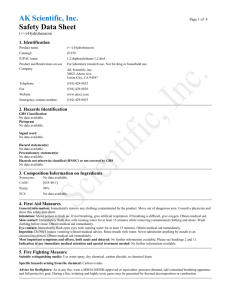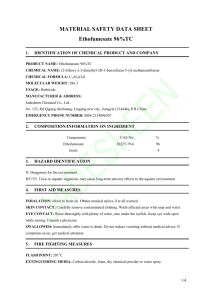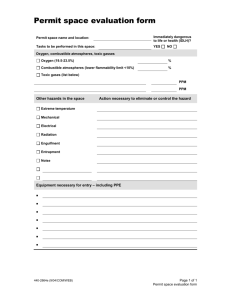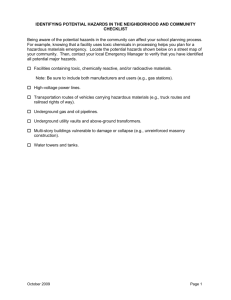0293 2,3-Dimethylcyclohexanol (mixture of isomers) (English) AAA
advertisement
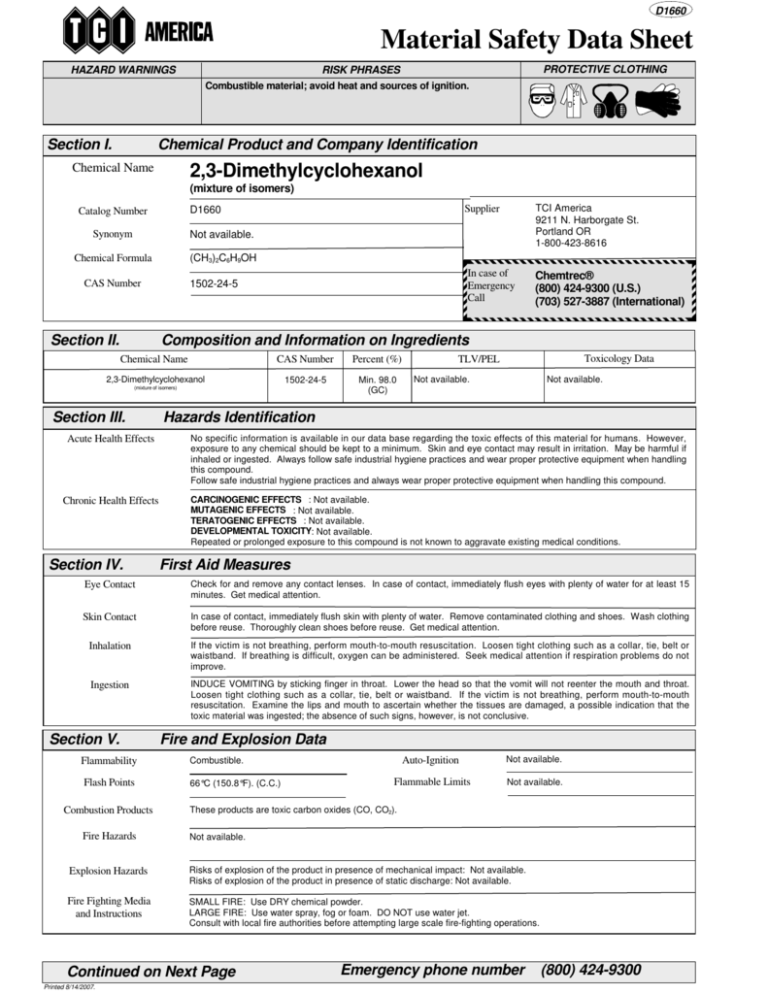
D1660 Material Safety Data Sheet PROTECTIVE CLOTHING RISK PHRASES HAZARD WARNINGS Combustible material; avoid heat and sources of ignition. Section I. Chemical Product and Company Identification 2,3-Dimethylcyclohexanol Chemical Name (mixture of isomers) D1660 Catalog Number Synonym Not available. Chemical Formula (CH3)2C6H9OH 1502-24-5 CAS Number Section II. Supplier TCI America 9211 N. Harborgate St. Portland OR 1-800-423-8616 In case of Emergency Call Chemtrec® (800) 424-9300 (U.S.) (703) 527-3887 (International) Composition and Information on Ingredients Chemical Name CAS Number Percent (%) 2,3-Dimethylcyclohexanol 1502-24-5 Min. 98.0 (GC) (mixture of isomers) Section III. Acute Health Effects Chronic Health Effects Section IV. Toxicology Data TLV/PEL Not available. Not available. Hazards Identification No specific information is available in our data base regarding the toxic effects of this material for humans. However, exposure to any chemical should be kept to a minimum. Skin and eye contact may result in irritation. May be harmful if inhaled or ingested. Always follow safe industrial hygiene practices and wear proper protective equipment when handling this compound. Follow safe industrial hygiene practices and always wear proper protective equipment when handling this compound. CARCINOGENIC EFFECTS : Not available. MUTAGENIC EFFECTS : Not available. TERATOGENIC EFFECTS : Not available. DEVELOPMENTAL TOXICITY: Not available. Repeated or prolonged exposure to this compound is not known to aggravate existing medical conditions. First Aid Measures Eye Contact Check for and remove any contact lenses. In case of contact, immediately flush eyes with plenty of water for at least 15 minutes. Get medical attention. Skin Contact In case of contact, immediately flush skin with plenty of water. Remove contaminated clothing and shoes. Wash clothing before reuse. Thoroughly clean shoes before reuse. Get medical attention. Inhalation If the victim is not breathing, perform mouth-to-mouth resuscitation. Loosen tight clothing such as a collar, tie, belt or waistband. If breathing is difficult, oxygen can be administered. Seek medical attention if respiration problems do not improve. Ingestion INDUCE VOMITING by sticking finger in throat. Lower the head so that the vomit will not reenter the mouth and throat. Loosen tight clothing such as a collar, tie, belt or waistband. If the victim is not breathing, perform mouth-to-mouth resuscitation. Examine the lips and mouth to ascertain whether the tissues are damaged, a possible indication that the toxic material was ingested; the absence of such signs, however, is not conclusive. Section V. Flammability Flash Points Combustion Products Fire Hazards Fire and Explosion Data Auto-Ignition Not available. Flammable Limits Not available. Combustible. 66°C (150.8°F). (C.C.) These products are toxic carbon oxides (CO, CO2). Not available. Explosion Hazards Risks of explosion of the product in presence of mechanical impact: Not available. Risks of explosion of the product in presence of static discharge: Not available. Fire Fighting Media and Instructions SMALL FIRE: Use DRY chemical powder. LARGE FIRE: Use water spray, fog or foam. DO NOT use water jet. Consult with local fire authorities before attempting large scale fire-fighting operations. Continued on Next Page Printed 8/14/2007. Emergency phone number (800) 424-9300 D1660 2,3-Dimethylcyclohexanol Page 2 (mixture of isomers) Section VI. Accidental Release Measures Spill Cleanup Instructions Section VII. Combustible material. Keep away from heat. Mechanical exhaust required. Stop leak if without risk. Prevent entry into sewers, basements or confined areas; dike if needed. Consult federal, state, and/or local authorities for assistance on disposal. Handling and Storage Handling and Storage Information Section VIII. COMBUSTIBLE. Keep away from heat. Mechanical exhaust required. Avoid excessive heat and light. Do not breathe gas/fumes/ vapor/spray. Always store away from incompatible compounds such as oxidizing agents, reducing agents, acids. Exposure Controls/Personal Protection Engineering Controls Provide exhaust ventilation or other engineering controls to keep the airborne concentrations of vapors below their respective threshold limit value. Ensure that eyewash station and safety shower is proximal to the work-station location. Personal Protection Splash goggles. Lab coat. Vapor respirator. Boots. Gloves. Suggested protective clothing might not be sufficient; consult a specialist BEFORE handling this product. Be sure to use a MSHA/NIOSH approved respirator or equivalent. Exposure Limits Section IX. Physical state @ 20°C Specific Gravity Molecular Weight Not available. Physical and Chemical Properties Liquid. (Clear, colorless.) Solubility Not available. Partition Coefficient Not available. 0.93(water=1) 128.21 Boiling Point Not available. Vapor Pressure Not available. Melting Point Not available. Vapor Density Not available. Volatility Not available. Refractive Index 1.465 Critical Temperature Not available. Odor Not available. Viscosity Not available. Taste Not available. Section X. Stability Conditions of Instability Incompatibilities Section XI. RTECS Number Routes of Exposure Toxicity Data Chronic Toxic Effects Acute Toxic Effects Stability and Reactivity Data This material is stable if stored under proper conditions. (See Section VII for instructions) Avoid excessive heat and light. Reactive with strong oxidizing agents, strong reducing agents, strong acids, acid chlorides, acid anyhydrides. Toxicological Information Not available. Eye Contact. Ingestion. Inhalation. Not available. CARCINOGENIC EFFECTS : Not available. MUTAGENIC EFFECTS : Not available. TERATOGENIC EFFECTS : Not available. DEVELOPMENTAL TOXICITY: Not available. Repeated or prolonged exposure to this compound is not known to aggravate existing medical conditions. No specific information is available in our data base regarding the toxic effects of this material for humans. However, exposure to any chemical should be kept to a minimum. Skin and eye contact may result in irritation. May be harmful if inhaled or ingested. Always follow safe industrial hygiene practices and wear proper protective equipment when handling this compound. Follow safe industrial hygiene practices and always wear proper protective equipment when handling this compound. Continued on Next Page Printed 8/14/2007. Emergency phone number (800) 424-9300 D1660 2,3-Dimethylcyclohexanol Page 3 (mixture of isomers) Section XII. Ecological Information Ecotoxicity Not available. Environmental Fate Not available. Section XIII. Disposal Considerations Recycle to process, if possible. Consult your local regional authorities. You may be able to dissolve or mix material with a combustible solvent and burn in a chemical incinerator equipped with an afterburner and scrubber system. Observe all federal, state and local regulations when disposing of the substance. Waste Disposal Section XIV. Transport Information Not a DOT controlled material (United States). DOT Classification PIN Number Not applicable. Proper Shipping Name Not applicable. Packing Group (PG) Not applicable. DOT Pictograms Section XV. Other Regulatory Information and Pictograms TSCA Chemical Inventory (EPA) WHMIS Classification (Canada) This product is NOT on the EPA Toxic Substances Control Act (TSCA) inventory. The following notices are required by 40 CFR 720.36 (C) for those products not on the inventory list: (i) These products are supplied solely for use in research and development by or under the supervision of a technically qualified individual as defined in 40 CFR 720.0 et sec. (ii) The health risks of these products have not been fully determined. Any information that is or becomes available will be supplied on an MSDS sheet. CLASS B-3: Combustible liquid with a flash point between 37.8°C (100°F) and 93.3°C (200°F). EINECS Number (EEC) 216-121-9 EEC Risk Statements Not available. Japanese Regulatory Data Not available. Section XVI. Other Information Version 1.0 Validated on 8/14/2007. Printed 8/14/2007. Notice to Reader TCI laboratory chemicals are for research purposes only and are NOT intended for use as drugs, food additives, households, or pesticides. The information herein is believed to be correct, but does not claim to be all inclusive and should be used only as a guide. Neither the above named supplier nor any of its subsidiaries assumes any liability whatsoever for the accuracy or completeness of the information contained herein. Final determination of suitability of any material is the sole responsibility of the user. All chemical reagents must be handled with the recognition that their chemical, physiological, toxicological, and hazardous properties have not been fully investigated or determined. All chemical reagents should be handled only by individuals who are familiar with their potential hazards and who have been fully trained in proper safety, laboratory, and chemical handling procedures. Although certain hazards are described herein, we can not guarantee that these are the only hazards which exist. Our MSDS sheets are based only on data available at the time of shipping and are subject to change without notice as new information is obtained. Avoid long storage periods since the product is subject to degradation with age and may become more dangerous or hazardous. It is the responsibility of the user to request updated MSDS sheets for products that are stored for extended periods. Disposal of unused product must be undertaken by qualified personnel who are knowledgeable in all applicable regulations and follow all pertinent safety precautions including the use of appropriate protective equipment (e.g. protective goggles, protective clothing, breathing equipment, facial mask, fume hood). For proper handling and disposal, always comply with federal, state, and local regulations. Printed 8/14/2007.
